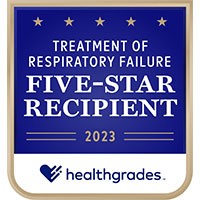Pulmonology
Winning the Seasonal Allergy Battle
If you’re like millions of people in the United States, the change into a new season like spring or fall can mean you’ll suffer with symptoms that come from seasonal nasal allergies, and many of those symptoms can be pretty severe. Seasonal nasal allergies—also referred to as hay fever or allergic rhinitis—is most commonly caused by pollen and mold spores in the air, which your immune system sees as harmful and overreacts to them. To fight the allergen, your immune system produces antibodies that travel to cells and release histamine and other chemicals, causing an allergic reaction.
What Are the Symptoms of Nasal Allergies?
The most common symptoms of nasal allergies are:
- Itchy nose and eyes
- Sneezing
- Stuffy nose (or congestion)
- Runny nose
- Mucus in the throat (postnasal drip)
What Types of Nasal Allergies Are There?
There are a few different types of nasal allergies you might experience:
- Seasonal allergies, sometimes called hay fever, are an allergic reaction to pollen from trees, grasses and weeds. These types of allergies occur mainly in spring and fall, when tree, grass and weed pollen is at its highest.
- Perennial allergies are caused by allergens that are present all year long. Primary culprits of these types of allergies are dust mites, mold, animal dander and cockroach debris.
- Non-allergic rhinitis is inflammation of the nose that is not caused by natural allergens. Individuals can experience this from smoke, chemicals or other irritating environmental conditions. Hormonal changes, physical defects of the nose (a deviated septum, for example) and overuse of nose sprays can also cause this condition.
What’s the Best Way to Treat Seasonal or Perennial Allergies?
Ideally, the best option is to avoid any contact or interaction with substances that trigger your allergies. If you are unable to avoid contact with allergens that affect you, you can try the following over-the-counter or prescription medications to help alleviate any symptoms:
- Antihistamines can relieve a runny nose, sneezing, itchy nose and itchy and watery eyes. These are usually taken by mouth or as a nasal spray.
- Decongestants help shrink the lining of nasal passages, which can help relieve nasal stuffiness. These can be taken by mouth, as a nasal spray or as drops.
- Nasal corticosteroids help reduce inflammation in the nose while blocking allergic reactions. These are used as a nasal spray and tend to be most effective because they can reduce all symptoms including nasal congestion while having few side effects.
- Immunotherapy is a long-term treatment that can help prevent or reduce the severity of allergic reactions and possibly eliminate allergies by modifying your body’s immune response to allergens. This may be a good option for those with more severe allergies that do not get complete relief from medications.
Can I Prevent My Allergies From Happening at All?
Avoiding contact with allergens is the best option, but if you are unable to do so, here are a few other prevention tips:
- Avoid touching or rubbing your nose
- Wash your hands often with soap and water
- Use a vacuum with a HEPA filter to reduce allergen exposure while vacuuming
- Wash your bed linens and pillowcases in hot water to reduce allergens
- Use dust mite proof covers for pillows and other applicable bedding
- Take showers at night to wash off any allergens that you may have on your body
- Keep pets out of the bedroom to reduce pet dander in your bedding
- Wear sunglasses and a wide-brimmed hat to reduce contact with pollen in your eyes
- Keep windows closed during high pollen and mold seasons

 If you have pulmonary problems or suffer from a chronic lung disease, Saint Vincent Hospital can help you breathe easier. Designed to improve your quality of life, services include:
If you have pulmonary problems or suffer from a chronic lung disease, Saint Vincent Hospital can help you breathe easier. Designed to improve your quality of life, services include: